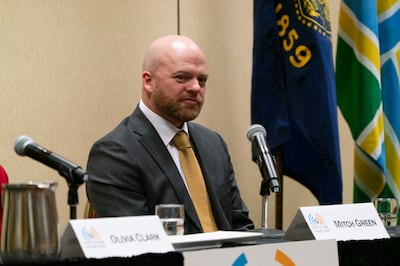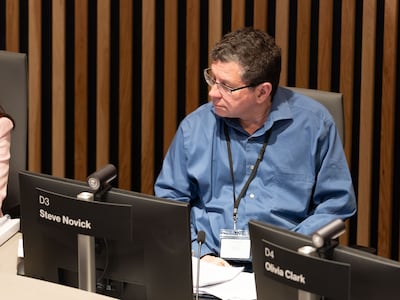Two weeks ago, the Portland City Council voted to redirect $2 million in new funding earmarked for the Portland Police Bureau to parks maintenance.
In response, the Portland Metro Chamber, the region’s chamber of commerce, said if the cut wasn’t restored before the council approved a final budget June 11, the chamber would oppose a Parks Levy on the November ballot.
Councilor Steve Novick has sought for the past two weeks to find a way to quell that threat by restoring the diversion of the $2 million.

On Wednesday afternoon, he succeeded in doing so—with the help of an unlikely ally, Councilor Mitch Green, a member of the Portland chapter of the Democratic Socialists of America.
The amendment Novick and his council colleagues passed by a 11–1 vote sets aside $2.2 million to fill vacant public safety positions.
It’s a small amount of money, and ultimately amounts to a shuffling around of unspent police dollars. But it’s significant because the deal satisfies the Metro Chamber—which means the council can move forward in pursuing a property tax increase with less resistance from the city’s business lobby.
The chamber says it is “ready to get to work helping shape a broadly supported levy dedicated to the maintenance, cleanliness, safety, and modernization of parks operations.” That statement makes it clear that the chamber, while supportive of a Parks Levy on the fall ballot, will have specific expectations and desires for what that levy looks like.
The council will decide in the coming months what size of a Parks Levy to refer to the November ballot. (Parks leaders have said that without a doubling of the current levy, the bureau will be forced to cut 25% of its programs and services.)
“The chamber commends the entire City Council—and Councilor Steve Novick’s leadership in particular—for restoring the approximately $2 million that was previously cut from the police budget," Andrew Hoan, the chamber’s president, said in a statement.
The compromise was struck in the 48 hours leading up to the council’s June 11 budget meeting.

The saga began two weeks ago, when the Metro Chamber called Novick and told him that if the council didn’t restore the $2 million that it had diverted from the Police Bureau, the chamber would do everything in its power to kill any Parks Levy placed on the November ballot.
So Novick drafted an amendment late last week that would carry over $2 million in unused Police Bureau dollars from the current year’s budget to restore the diverted funds.
He initially thought he had the votes to pass it. But sometime on Tuesday, according to sources familiar with the matter, Novick learned he likely did not have the seven votes he needed.
So, on Wednesday morning, Novick proposed his amendment as he originally wrote it. But he noted that Green would be proposing a replacement amendment that he’d support, what Novick jokingly called a “friendly complete replacement.”
Green did exactly that.
Green proposed that $2.2 million in unused Police Bureau funds be placed in a set-aside fund available only to the city’s Public Safety Service Area—which includes the Police Bureau, Portland Street Response, the Portland Bureau of Emergency Communications, and Portland Fire & Rescue—instead of the Police Bureau directly. Public safety bureaus and programs within the service area would then request chunks of those funds from the service area’s director, Bob Cozzie, for specific uses related to recruiting and filling vacancies.
“We need to move past this practice of rolling forward vacancy savings in a bureau‚" Green explained. “Bureaus would go to [Director Bob Cozzie] and say: I have a targeted need, I want to do some recruitment spend to accelerate our pipeline, and then Director Cozzie would request from council to draw upon that set-aside. This does not move funds away from public safety.”
Novick noted that Cozzie would return to the council in the coming months to develop a list of recommendations about how the funds could be spent across the public safety bureaus.
Green’s amendment passed by an 11–1 vote. But some who supported the amendment, like Councilor Angelita Morillo, expressed their deep displeasure in what had gone on behind the scenes over the past two weeks.
Morillo was especially irked that the council was unaware that the Police Bureau had around $3 million in unspent funds from the current fiscal year until just last week.
“I also think it’s completely absurd and insulting that the Police Bureau randomly pulled out $3 million of funds that were sitting unspent a week ago and that we just found out about that a week ago as the budget body,” Morillo said, adding that “if any other bureau did that, my colleagues would be completely aghast and would throw an absolute fit about it, so I’m throwing a fit about this one.”
Zimmerman responded to Morillo, saying that bureaus shaking loose unspent funds near the end of the fiscal year is a typical financial practice, and that those funds are addressed by the council in the fall and spring budget monitoring processes.
“Every bureau turns money in at the end of the year given a variety of reasons,“ Zimmerman said. “To think this is some sort of grand conspiracy is disheartening. So let’s not take it out against one bureau who is saying, we have a fix to a thing that you all did last week when all bureaus are going to come forward and say, this is the savings we had.”
Councilor Candace Avalos, who championed the proposal two weeks ago to divert the $2 million in new police money to offset parks cuts, supported the amendment but also expressed displeasure about the circumstances that led to the compromise.
“This feels like it was a result of clearly councilors being pressured to put police money back. That feels frustrating to me,” Avalos said. “This was a negotiation around people wanting to put the money back into police, other people not wanting to. How do you get to those seven votes? I’m leaning toward supporting it. But I do in principle don’t like that we’re doing this.”
The City Council will decide in the coming months what size of a Parks Levy it will refer to the November ballot. Recent polling suggest that voter support is soft for doubling the levy (from its current 80 cents per $1,000 in assessed property value to $1.60), even in the absence of an opposition campaign.

